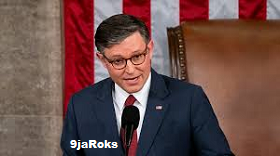US: Republicans re-Vote Mike Johnson as House speaker

The Nation United States House of Representatives has re-Voted Republican Mike Johnson as Speaker, a vote that highlighted the party's unity ahead of President-elect Donald Trump’s second Regime in the White House.
He came out on top after a tense first round of voting, where several members of his party initially refrained from voting due to doubts about his role in recent bipartisan budget negotiations. Eventually, he secured the speakership with 218 votes out of 435 after two important holdouts, Ralph Norman of South Carolina and Keith Self of Texas, changed their positions following an intervention from Donald Trump.
The 215 Democratic votes were directed to minority leader Hakeem Jeffries. Representative Thomas Massie, who had previously committed to rejecting Johnson, chose to vote for fellow Republican Tom Emmer instead.
The narrow result emphasized the precarious control Republicans maintain over the House, with the party needing nearly every vote to preserve its majority. This also tested Trump’s influence, as he had urged the party to back Johnson while getting ready to implement his tax cuts and mass deportation policies after taking office on January 20.
The election for Speaker was held on the first day of the 119th Congress, after November’s general election, which saw Republicans secure majorities in both the House and Senate following the GOP’s takeover of the upper chamber.
In the days before the vote, several Republicans had committed to opposing Johnson, especially after his involvement in the passage of a bipartisan budget bill in December. However, by Friday morning, prominent Republican figures, including Trump, rallied in his support.
President Trump took to social media: “Best wishes to Speaker Mike Johnson today, an outstanding individual with great skill, who is very close to receiving complete support. A victory for Mike today will be a significant win for the Republican Party, and another recognition of our 129-year most defining Presidential Election!!”
In the final count, after the roll-call vote, Johnson reached the 218 votes necessary for a win, fortifying his place as the third most influential politician in the United States.
















